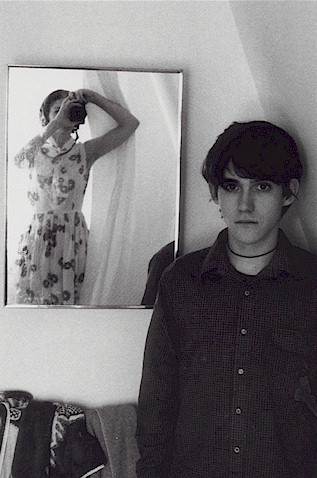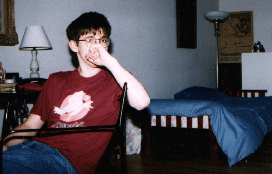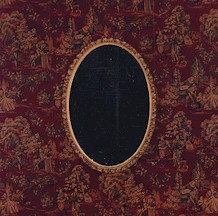|

Big in Japan
With a hot new album, a publishing deal and a
multi-continental tour on the horizon, Bright Eyes' Conor Oberst has nothing to
be sad about.
by tim mcmahan
|
|
|
Lazyeye: May 27, 2000 |
I tried to
listen to Bright Eyes' -- a.k.a. Conor Oberst's -- new CD, Fevers and Mirrors,
while I wrote this story, to give it sort of a subconscious ambiance, but it was
impossible.
Oberst's music has always been moody and sadly fey, but never quite so, well, hummable.
It simply will not be ignored or overwritten by my thoughts, because when Oberst sings, he
sounds like a guy who's just been told offhandedly that someone saw his ex-girlfriend at
the mall with some new guy, just days after a painful breakup.
Oberst's music goes beyond raw emotion to deep-blue empathy -- that pointless, useless
feeling when you realize there's nothing you can do about whatever it is that is bound to
break your heart (just like you dreaded it would). His music is about wearing your heart
on your sleeve so brightly that the image leaves light-stains on your tear-soaked retinas.
His songs are emotional exorcisms, crater-sized heart-lumps, the choking breaths of a
child trying hard not to cry. He adds to his dreadfully stark lyrics of regret and loss --
and ultimately, pain -- a quivering vibrato of a voice that is trapped in that fuzzy-gray
borderland between quiet sobbing and catatonic numbness. Oberst encapsulates longing in
4-minute cycles, each one a little world of regret. And just when you thought he couldn't
make those bittersweet painsores any more appealing, he pushes the sound a little further
into pop and painstakingly creates an aural atmosphere of shallow recovery after a long
night of anguish.
You listen. You get depressed. You ultimately feel better for it. |
|
|
His pain has
caught on in a worldwide way. The next time you drag yourself to the Cog Factory or Sokol
Underground to watch Oberst do his thing in front of a crowd of 50 or so
slumped-shouldered, bespeckled emo-nerds, remember that you are not alone.
Try to imagine his recent in-store performance at the Tokyo Tower Records -- 150
Japanese kids just like you except dressed so much better, so much hipper. They surround a
makeshift stage where shaggy-haired Oberst leans forward over his guitar, his eyes closed
as he bends to the mic, while behind him looms a 36-square-foot TV replica of himself,
staring down knowingly. As he finishes his 5-song set -- the only songs he would sing on
the multi-continental journey -- he settles behind a table to sign autographs for fans who
wait in an orderly queue. Some of the girls cry in an Elvis-goes-to-war sort of way. When
Oberst agrees to allow his picture to be taken with a fan, the handlers become irate --
the last thing they want is a riot on their hands.
"The whole thing was so surreal," Oberst says in a high voice that betrays
his youth. "What I was thinking at the time was 'This is crazy.'"
He recalled the tour from the back balcony of his parent's mid-town Omaha home, where
he's been housesitting for the past few days. It's a nice, ivy-covered sort of place, but
no mansion. Oberst sipped red wine and smoked a couple cigarettes while traffic meandered
below on Miami St.
"Playing only five songs after being there for a week seemed ridiculous," he
said. "Tokyo was so futuristic and depressing. Bad News Records, our label in Japan,
brought Mike Mogis and me over for a promotional visit for the EP (last fall's Every
Day and Every Night). We did one show and six days of grueling interviews from 10 a.m.
to 9 p.m., to the point where every meal we ate was with a magazine reporter or at a
photoshoot. I've never had my picture taken so many times in my life."
Doing interviews is bad enough when someone like me is asking the questions. Imagine
the questions coming at you in a completely foreign language, translated in broken
English.
"Our translator would bring someone in, take the questions, then look at the clock
and shuffle in the next interviewer. It was very regimented," Oberst said. "The
Japanese ask really good questions. Part of it is because most of the interviews and
journalism we deal with in America are more amateur-based. These were the biggest
magazines in Japan, and the Japanese are really in tune with what the music's about. The
whole music scene over there is weird. A lot of obscure American bands are very popular
there."
Take Papas Fridas, the little-known Boston-based trio who record on
Minty Fresh Records. "They're huge over there," said Oberst, admitting he had
never actually heard their music before. "We saw posters of them everywhere. They're
like the Beatles."
To this day, Oberst still doesn't know how well he came off in those interviews. The
result of the press junket is the 18 or so magazines stacked up in Robb Nansel's Saddle
Creek Records' office, written in Japanese. "Robb would get all these funny e-mails
from the Bad News that said, 'We are making big name for Bright Eyes music scene.'"
After Japan came a brief tour of Belgium, France and Holland, set up by a Belgium
distributor called "Bang" who brought Oberst and Mogis over to boost the EP's
sales. They toured with the French band Tahiti 80 to crowds that ranged from 50 to 60 to a
huge festival audience in Brussels.
For the first time, Oberst says, he got a taste of what it's like to be a star, and
he's not entirely sure that he likes it. "It made me question everything we've worked
for," he says, referring to the Saddle Creek Records stable of bands in which he's
the leading thoroughbred. It's a stable that includes Cursive, The Faint and Lullaby for
the Working Class, all bands that have had successful releases from an indie-label
standpoint. But none have topped what Oberst is doing with Fevers and Mirrors.
Released nationally May 29, the CD has been in the hands of eager college radio station
programmers for months. As of this week, the CD is on the verge of breaking the top-20 on
the College Music Journal charts. CMJ is the bellwether of the indie world, compiling
college and non-commercial radio airplay reports, as well as other key industry
indicators. |
"We did one show and six days of
grueling interviews from 10 a.m. to 9 p.m., to the point where every meal we ate was with
a magazine reporter or at a photoshoot. I've never had my picture taken so many times in
my life."
|

"I have some control over what they can
do. I can't say 'No, you're not going to put my song in that new Claire Danes movie,' but
I could stop it from being used in a beef commercial."
|
"Since
we started the label, we've done nothing but try to get people to recognize the music
we're making," Oberst said. "Now Robb has a record at the top of the CMJ list
and is able to run the record label full-time. These are things we dreamed about that have
come true. But then there's all these drawbacks you never thought of, like the press and
the whole idea of so many people knowing about you and what you do and your opinions. And
then there's the money people. It can get bad. It comes down to making smart decisions and
playing with people who seem honest and good, and trying to ignore the rest of the shit.
Some people succeed with that and a lot go crazy and decide to go hide in a cabin. Now I
can understand why."
Oberst doesn't look like a rock star in his well-worn baseball shirt, jeans, double
wrist bands and dark-brown shaggy hair. He looks more like someone's little brother or a
guy you'd bump into at the soda fountain at your neighborhood convenience store. The only
clues that he might be someone important is the cell phone that sleeps next to a cordless
phone on the windowsill by the table.
He has, however, grown up from the boy wonder with the nerdy glasses and unkempt hair
of just a couple years ago, when he released his second Bright Eyes full-length, the
dreary Letting off the Happiness (his first was the low-fi A Collection of
Songs… in 1998). And even more so since his first taste of fame as a member of
Commander Venus, an emo-esque rock band that toured the coasts with Thick Records picking
up the tab. Oberst was still an underclassman in high school.
Now in his 20s, Oberst is finding himself snarled in contract negotiations with Sony,
on the verge of signing a publishing rights deal that, for a start, will net him a $50,000
advance for the publishing rights to Fevers and Mirrors. The deal began to form
during the recording of the CD last fall. A Sony honcho flew in from Chicago in January to
see a Bright Eyes show. "He said 'I really want this. Get a lawyer,'" Oberst
said. "So I got a lawyer and the negotiations have taken forever. Supposedly I'll be
signing this contract in Athens in the next few days (this was a week or so ago). It's
been through four or five drafts. There's so much stuff I don't know about, I just don't
have that kind of knowledge."
He said the deal allows Sony to take his existing music and try to make more money from
it by getting it placed in movie or TV shows, or even having another performer cover it.
"They can't have someone cover one of my songs before I release it, though,"
Oberst said. "I have some control over what they can do. I can't say 'No, you're not
going to put my song in that new Claire Danes movie,' but I could stop it from being used
in a beef commercial."
Oberst is banking that the nature of his music will make it appropriate for
"cooler" projects, like movies, and says his representative from Sony has signed
similar deals with acts such as indie darlings Belle and Sebastian. "He has a sense
about cool music," Oberst said.
"For me it was the most natural thing to do. I have no desire to sign a big
recording contract. Sony hasn't offered anything like that, though scores of major labels
have been calling. The publishing deal was my way of being a professional musician without
getting locked into a recording contract. Everything between me and Robb is based on
friendship, and Sony can't tell me what to do or what I can release."
Signing a major label record deal, Oberst added, ultimately would mean a loss of
control that he simply couldn't live with. "It would interfere with what I want to
do, which is make music completely on my own," he said. "I'm doing what a lot of
bigger indie bands that don't make money off sales do. They benefit from either a
publishing deal or having a great booking agent who can bring them home 10 grand after a
tour. Besides, I never want to own a mansion."
There's nothing that Sony would like more than to have Oberst sign a deal with a major
label, immediately increasing the value of their publishing rights. The enticement to do
so comes in the form of doubling the artist's advance money if his CD is released by a
major label. |
|
|
And Fevers
and Mirrors certainly has all the makings of a major label release. With the luxury of
having more than a month of recording time at Dead Space Studios (owned and operated by
Lullaby for the Working Class' Mogis brothers), Oberst found himself reunited with Letting
off the Happiness producers Mike Mogis and Andy Lemaster for what arguably is his
most-realized effort to date.
"We went the extra step of making parts tight that before would have been
sloppy," Oberst said. "That never used to bother us. Everything this time was
the best we could do because we had the time we wanted. Mike and Andy are perfectionists
about certain things. They were really nitpicky; and I ended up doing a lot of stuff over
that I wouldn't have if I had made the record."
Though Oberst points to the recording handiwork as "the big difference" about
the CD, anyone who's heard his other recordings will immediately point toward the
poppiness of the melodies, the artful supporting players and the downright tunefulness of
it all. It's as if Oberst decided that if he can't brighten the lyrics, he could at least
brighten the melodies some. Tracks, such as "Haligh, Haligh, A Lie, Haligh,"
which features Mogis' lilting pedal steel; the driving "The Calendar Hung
Itself," featuring The Faint's Todd Baechle on keyboards; and the Radiohead-esque
"The Movement of a Hand;" all would sound comfortable on your FM radio.
But as upward sounding as the melodies are, the lyrics are as melancholy and
introspective as anything Oberst has ever done. Take "Haligh, Haligh…" for
example, which starts:
The phone slips from a lose grip
Words were missed then some apology
"I didn't want to tell you this
It's just some guy she's been hanging out with
O I don't know the past couple weeks I guess"
Thank you and hang up the phone
Let the funeral start, hear the casket close
Let's pin split-black ribbon to your overcoat
All to a toe-tapping beat. When Oberst was putting the CD's package together, he
agonized over writing liner notes that would explain what he was trying to convey. He
opted against it as being too pretentious, and instead included a nearly 6-minute scripted
faux "interview" performed by Todd Baechle and former Lullaby for the Working
Class member Matt Silcock. The Oberst character answers questions from a smooth-talking FM
radio DJ, who asks about the meaning of the CD's title, its symbolism, and Oberst's
depression.
"Some of the answers in the interview are honest," the real Oberst said,
"but a bunch is bullshit, mixing truth with falsehood and making it blend together in
a surreal sort of way. It's not intended to be a real interview, but some people think it
is."
It wouldn't be the first time that listeners took his music too literally. When
"Padraic My Prince" from Letting Off the Happiness was released with the
lyric, "I had a brother once/He drowned in a bathtub before he ever learned how to
talk," many thought the song was autobiographical. It wasn't.
"I believe in a big separation between art and the artist," Oberst said.
"You make this art that has a lot to do with what you're going through and thinking,
but it's still not you. I can go through lines on the CD that are direct references to
people, while other stuff is just what's going through my head, drawn from other people's
lives, books and movies. It shouldn't matter what parts have to do with me and which
don't. People are just dying for it to be true, but it's not my personal story.
"We tried to keep this one upbeat, but sad music is my favorite. My most favorite
sad music is the stuff that gives you hope that everything will be all right, that we're
all in this together, that you're gonna wake up tomorrow and be cool. I think some of that
came through."
With the CD in the stores, Oberst, with a revolving band of Saddle Creek associates
backing him, will be spending most of the summer and fall on the road, starting with gigs
in Athens, New York and London before coming back to Omaha for a June 17 show at Sokol
Underground. Then it's off to another U.S. tour in July before heading overseas for two
weeks of shows in Japan, then going to Europe for "a real tour this time. We're using
one of the biggest booking agents over there, someone who books shows for Radiohead, Smog
and Catpower. It was a super longshot thing that went through."
But what about the adoring fans here in the good ol' USA? Oberst says he's surprised to
find that even in the most remote locations there are a kids who know about him and the
Saddle Creek label. "Some even know the most minute details about our
relationships," he said. "It's exciting to reach people who appreciate what
we're doing on a genuine level."
Back to 
Published in Omaha Weekly May 25, 2000. Copyright © 2000 Tim
McMahan. All rights reserved. |

"It shouldn't matter what parts have to
do with me and which don't. People are just dying for it to be true, but it's not my
personal story."
|
|

![]() webboard
interviews
webboard
interviews